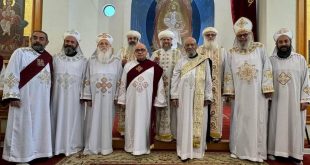In the Name of the Father, the Son, and the Holy Spirit, One God. Amen. On December 18, 2023, the Dicastery of the Doctrine and the Faith of the
Roman Catholic Church issued a Declaration Fiducia Supplicans on the Pastoral Meaning of Blessings.
This is an official Vatican document approved and signed by Pope Francis, and based on his teaching and pastoral vision.
The major points of the Declaration are as follows.
First, the Declaration remains firm on the traditional doctrine of the Catholic Church on marriage, which is, Marriage is the exclusive, stable, and indissoluble union between a man and a woman, naturally open to the generation of children, and what contradicts it is indilmissible. It is only in this context sexul relations find their natunil, proper, and fully human maining.
The Church doctrine on this point remains firm (Panagraph 4).
Second, the Declaration does not allow any type of liturgical rite or blessings similar to the liturgical rites that can create confusion.
Third, the Declaration offers a specific and innovative contribution to the pastoral meaning of “blessing.” permitting a broadening and enrichment of the classical understanding of “blessing that is closely linked to the liturgical perspective.
Fourth, the Declaration is based on the pastoral vision of Pope Francis and implies a real development in the definition of “blessing” in the official text of the Church.
The core part of the Declaration is that one can understand the possibility of “blessings” for couples in an irregular marriage or same-sex union without officially validating their status or changing in any way the traditional Church teaching on marriage.
My comments on this declaration are in two points, (1) the meaning of “blessing” and (2) the aim of pastoral care. The Meaning of “Blessing” Regarding the meaning of “blessing,” I may ask why couples who are in irregular marriages or same-sex relationships come to the Church seeking a blessing, whether liturgical or otherwise?
Do they come seeking God’s help and mercy to lead them to separate and repent?
Or are they practically coming to seek the Church’s blessing to validate (whether this validation is official or not) and to accept their union?
The Declaration confirms that such sexual relationships in an irregular marriage or same-sex union are sinful and against the teaching of the Church on marriage and sexuality.
Then how can the Church bless what the Church considers sinful? Is this not a real confusion?
Or is it confusion only if the blessing is liturgical? Imagine a Catholic priest teaching a class on the Church’s teaching on marriage and sexuality and stating very clearly the Church’s moral teaching.
After the class, a couple in an irregular marriage or same-sex union come to him and request a blessing.
Does he bless them?
Does he bless what he just said was against the moral teaching of the Church?
The Aim of Pastoral Care The second point is the aim of pastoral care. It is of course imperative to extend pastoral care to all as God’s mercy is to all people, particularly sinners. The purpose of pastoral care is to lead them to repent.
To extend pastoral care to those in irregular marriages or same-sex unions by blessing their relationship —will this direct them to repent?
Or will it actually direct them to remain in their sinful relationship?
It is understandable if a person, a man or a woman in an irregular marriage or same-sex union, comes to the Church seeking help and God’s mercy through the Church’s blessing to strengthen him or her to repent and live a life of purity.
But if a man comes with his girlfriend or his male partner to the Church and the Church blesses this couple, is the Church leading them to repentance or is the Church leading them to remain in sin and feel that their actions are now blessed by the Church?
In the end, we sincerely regret the issuance of such a declaration that created confusion and division in the Catholic Church.
Our Church is in a theological dialogue with the Roman Catholic Church, so our Church, along with the Oriental Orthodox Churches who are with us in the dialogue, will express our deep concern and ask for clarification from the Catholic Church in the coming theological dialogue in January 2024.
We will forward our conclusions to the Synodical Committee on the Ecumenical Relationship to be presented to the Holy Synod in March 2024 so we may decide about our stance regarding this theological dialogue. We learn from this the dangers of innovation.
We may bring renewal, but not innovation as this declaration did by not using clear language in its theological and moral teaching. Let us remember what St. Paul said to his disciple, Timothy, when he commanded him, “O Timothy! Guard what was committed to your trust, avoiding the profane and idle babblings and contradictions of what is falsely called knowledge (1 Ti 6:20-21).
May our Lord Jesus Christ keep the peace of the Church and protect His people from any deviation, and grant all of us a life to glorify Him.
To Him is glory now and forever. Amen .
Metropolitan Serapion , Bishop of Los Angeles and Metropolitan of Southern California and Hawaii
 جريدة الأهرام الجديد الكندية
جريدة الأهرام الجديد الكندية 




